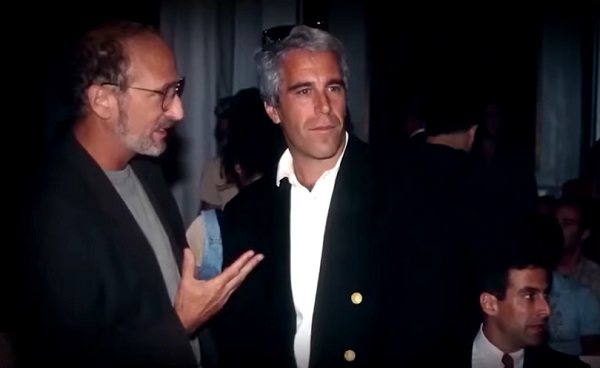Crime
FBI releases incomplete set of files on sex trafficker Jeffrey Epstein, triggering public outcry

From LifeSiteNews
Attorney General Pam Bondi and the public are demanding that the FBI release the full set of files related to the investigation of reported intelligence asset Jeffrey Epstein.
The FBI released about 200 pages of files on Thursday pertaining to sex trafficker and reported intelligence asset Jeffrey Epstein, a mere fraction of the thousands of pages of files said to be in the FBI’s possession.
After a request by the recently created Congressional “Task Force on the Declassification of Federal Secrets” for the complete declassified Epstein files, the FBI issued to Attorney General Pam Bondi’s office what she described as “approximately 200 pages of documents, which consisted primarily of flight logs, Epstein’s list of contacts, and a list of victims’ names and phone numbers.”
Conservative commentator Jack Posobiec, who was among several media pundits spotted on Thursday outside the White House with binders reading “The Epstein Files: Phase 1,” confirmed in a Thursday podcast immediately afterward that the binder contains flight logs and a “rolodex of some of names we already knew from Epstein Black Book.”
Commentator Liz Wheeler, who also received Thursday’s Epstein file binder, confirmed the same, telling on X how Bondi did not discover until Wednesday night that the Southern District of New York “was hiding potentially thousands of Epstein files, defying Bondi’s order to give them all to her.”
“We’re talking recordings, evidence, etc. The juicy stuff. Names,” Wheeler added.
“These swamp creatures at SDNY deceived Bondi, Kash, and YOU. Be outraged that the binder is boring. You should be. Because the evil deep state LIED TO YOUR FACE,” she continued.
In light of this withholding, Bondi on Thursday ordered FBI Director Kash Patel to deliver the “full and complete Epstein files” to her office by Friday at 8 a.m.
She noted in her letter that she learned from a source that “the FBI Field Office in New York was in possession of thousands of pages” of Epstein files.
While some Epstein flight records have been released in previous litigation, they remained limited, as does other information regarding Epstein’s associates. U.S. Sen. Marsha Blackburn filed a subpoena in late 2023 to obtain the complete flight logs, and in January 2025 accused Democratic U.S. Sen. Dick Durbin of blocking her request.
As reported extensively by LifeSiteNews, the Epstein saga has drawn international headlines for years after it became apparent the billionaire sex offender had ties to the Clintons, Prince Andrew, Bill Gates, and other high-profile elites.
Investigative Journalist Whitney Webb has discussed in her book “One Nation Under Blackmail: The Sordid Union Between Intelligence and Crime That Gave Rise to Jeffrey Epstein,” how the intelligence community leverages sex trafficking through operatives like Jeffrey Epstein to blackmail politicians, members of law enforcement, businessmen, and other influential figures.
One example of evidence of this, according to Webb, is former U.S. Secretary of Labor and U.S. Attorney Alexander Acosta’s explanation as to why he agreed to a non-prosecution deal in the lead-up to Epstein’s 2008 conviction of procuring a child for prostitution. Acosta told Trump transition team interviewers that he was told that Epstein “belonged to intelligence,” adding that he was told to “leave it alone,” The Daily Beast reported.
While Epstein himself never stood trial, as he allegedly committed suicide while under “suicide watch” in his jail cell in 2019, many have questioned the suicide and whether the well-connected financier was actually murdered as part of a cover-up.
These theories were only emboldened when investigative reporters at Project Veritas discovered that the major news outlets of ABC and CBS News quashed a purportedly devastating report exposing Epstein.
On December 18, 2023, Senior U.S. District Judge Loretta Preska of the Southern District of New York issued an order to unseal hundreds of documents revealing the identities of individuals who hold various connections to Epstein.
The 4,553 pages of documents then released to the public were heavily redacted and included the names of more than 150 people identified during the investigation of Epstein and his sex trafficking operation. However, many of these individuals had already been identified in previous public documents and interviews, and many were not accused of crimes.
In the final batch of unsealed documents, Epstein victim Virginia Giuffre said he paid her $15,000 in 2011 to have sex with Britain’s Prince Andrew, and that she had sex multiple times with retail mogul Leslie Wexner, who was a financial client of Epstein’s for at least 20 years.
A full list of the names of people mentioned in the previously released Epstein files, including many who have not been accused of any crimes, can be found here. Previously published Epstein flight logs show that former President Bill Clinton along with Secret Service members, actor Kevin Spacey, comedian Chris Tucker, and British model Naomi Campbell all flew on Epstein’s private plane central to his sex trafficking case, dubbed the “Lolita Express” by the media.
2025 Federal Election
London-Based Human Rights Group Urges RCMP to Investigate Liberal MP for Possible Counselling of Kidnapping

Hong Kong Watch says MP Paul Chiang’s remarks about delivering rival Joe Tay to the Chinese Consulate may amount to criminal conduct under Canada’s Criminal Code.
On Monday, more than 40 Hong Kong diaspora organizations across Canada, the United States, the United Kingdom, Australia, and Germany issued a joint statement condemning Chiang’s remarks and calling for immediate action from Prime Minister Mark Carney.
2025 Federal Election
Beijing’s Echo Chamber in Parliament: Part 2 – Still No Action from Carney


 Dan Knight
Dan Knight
As Michael Chong reveals Canadians coerced by China, Mark Carney continues to protect Paul Chiang—proving once again the Liberal swamp won’t police its own, even when national security is on the line.
This is no longer just a political scandal—this is a national disgrace. Joe Tay, the Conservative candidate targeted by Paul Chiang’s shocking comments, has now broken his silence—and it’s nothing short of damning.
In his official statement, Tay pulls no punches. He calls Chiang’s words what they are: “threatening public comments… intended to intimidate me.” Not debate. Not disagreement. Intimidation. And Tay makes it crystal clear: “no apology is sufficient.” Why? Because this isn’t some offhand gaffe—this is the exact playbook of the Chinese Communist Party, imported straight into Canadian politics.
Let that sink in. A Canadian MP, standing on Canadian soil, echoed a bounty issued by a hostile foreign regime. And the man targeted—Joe Tay—says it plainly: “Suggesting that people collect a bounty from the Chinese Communist Party to deliver a political opponent to the Chinese Consulate is disgusting and must never be condoned.”
Disgusting—and yet, here we are. Paul Chiang is still in the Liberal fold. Mark Carney, the man who wants to run the country, says nothing. Meanwhile, Tay is left fearing for his safety—already in touch with the RCMP before the public even knew what Chiang had said.
This is the state of Canadian politics under the Liberal machine: where the only people paying a price are the ones speaking out. Where the candidate who exposes foreign interference is the one who needs police protection. And the one who parrots CCP propaganda? He gets to keep his seat.
Even Michael Chong—a guy who knows firsthand what CCP intimidation looks like—is stepping in and asking the obvious question: Why is Paul Chiang still a Liberal candidate?
Chong just posted on X (formerly Twitter) that at least three Canadians have already been coerced into returning to the People’s Republic of China against their will. Against their will. Think about that. Beijing is actively running transnational repression ops on Canadian soil—and now, one of Carney’s own candidates is joking about turning a political opponent over to the CCP for a cash reward. And we’re supposed to believe the Liberals take foreign interference seriously?
Chong’s post includes actual evidence—parliamentary testimony, U.S. indictments, and RCMP-relevant keywords like “United Front,” “overseas station,” and “minutes or less.” In other words, this isn’t conspiracy talk. This is real. It’s happening. And it’s been happening under the Liberals’ watch.
And still, Paul Chiang stays in the race. No suspension. No investigation. Nothing from Carney, the security-cleared savior of the Liberal establishment.
And here’s where the hypocrisy hits terminal velocity.
Remember, Mark Carney has a security clearance. That’s been his whole pitch. That somehow he is more qualified to lead Canada because he has access to classified intelligence. Because he is in the know. He’s the grown-up in the room. The steady technocrat with one foot in the Privy Council and the other in Davos.
Well, here’s a question: What good is a security clearance if your own MPs are acting like a propaganda arm for Beijing?
Because while Mark “Bank of China” Carney sits on his classified briefings, his Liberal MP Paul Chiang is out there, on camera, floating the idea that a Conservative candidate should be delivered to a Chinese consulate to “claim the bounty” placed on his head by the Chinese Communist Party.
Let’s repeat that: A Canadian MP is echoing a CCP-issued bounty, and Carney—the man with all the intelligence, all the briefings, all the supposed national security credentials—says nothing. Not a peep. Not even a token tweet.
So what exactly is that security clearance buying us, Mark? If you’re such an expert on foreign threats, why can’t you recognize one when it’s sitting in your own caucus?
It’s a joke. The entire premise of Carney’s leadership bid is unraveling in real time. He promised Canadians he could stand up to foreign interference—meanwhile, his own candidate in Markham–Unionville is out there sounding like a CCP press secretary. And instead of showing leadership, Carney hides behind talking points, closed-door fundraisers, and his carefully curated media handlers.
Joe Tay is right. This isn’t just about intimidation—it’s about sending a “chilling signal to the entire community.” And the message from Carney is loud and clear: if you’re a threat to the Liberal regime, they’re not just coming for your policies. They’re coming for you.
Security clearance? Please. It’s not leadership if you only speak up when it’s politically convenient. And if Carney won’t condemn this, then he’s not qualified to lead a PTA meeting, let alone a country.
-

 Uncategorized1 day ago
Uncategorized1 day agoPoilievre on 2025 Election Interference – Carney sill hasn’t fired Liberal MP in Chinese election interference scandal
-

 Business2 days ago
Business2 days agoCuba has lost 24% of it’s population to emigration in the last 4 years
-

 2025 Federal Election1 day ago
2025 Federal Election1 day ago2025 Election Interference – CCP Bounty on Conservative Candidate – Carney Says Nothing
-

 2025 Federal Election14 hours ago
2025 Federal Election14 hours agoChinese Election Interference – NDP reaction to bounty on Conservative candidate
-

 Aristotle Foundation2 days ago
Aristotle Foundation2 days agoCanada has the world’s MOST relaxed gender policy for minors
-

 2025 Federal Election1 day ago
2025 Federal Election1 day ago2025 Federal Election Interference from China! Carney Pressed to Remove Liberal MP Over CCP Bounty Remark
-

 International2 days ago
International2 days agoTrump signs executive order to make Washington D.C. “safe and beautiful”
-

 Media1 day ago
Media1 day agoTop Five Huge Stories the Media Buried This Week








